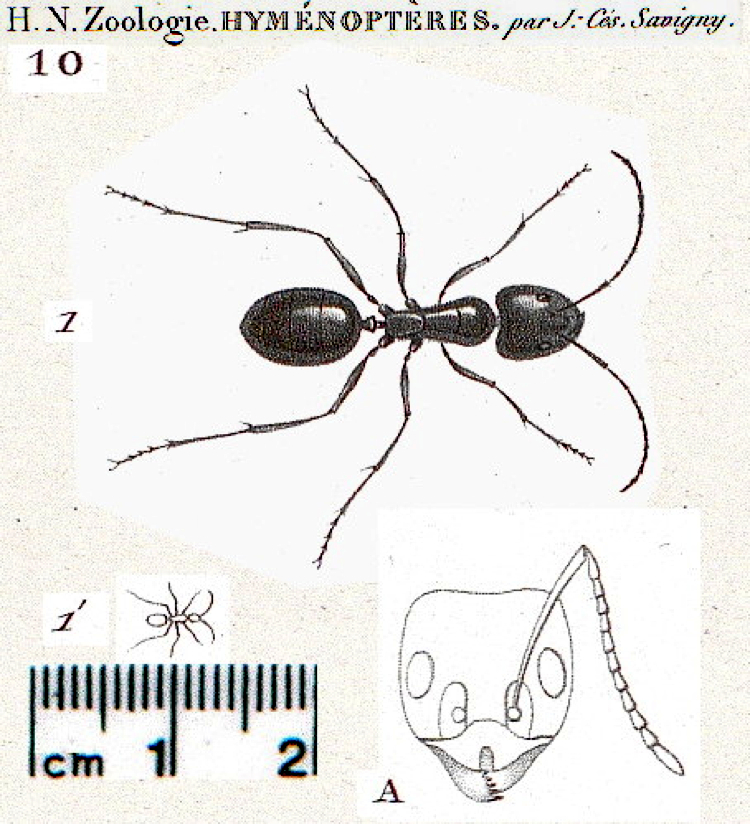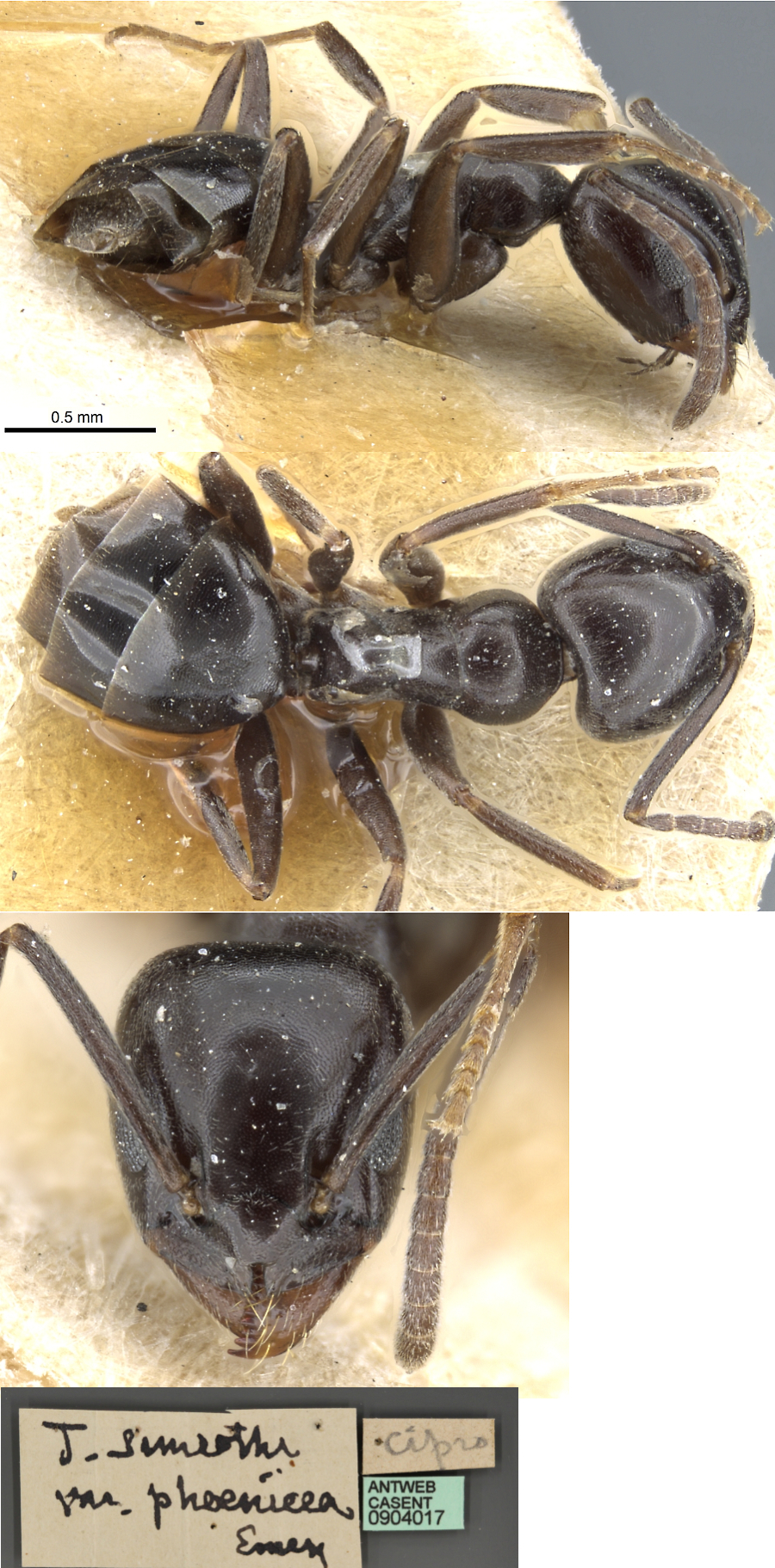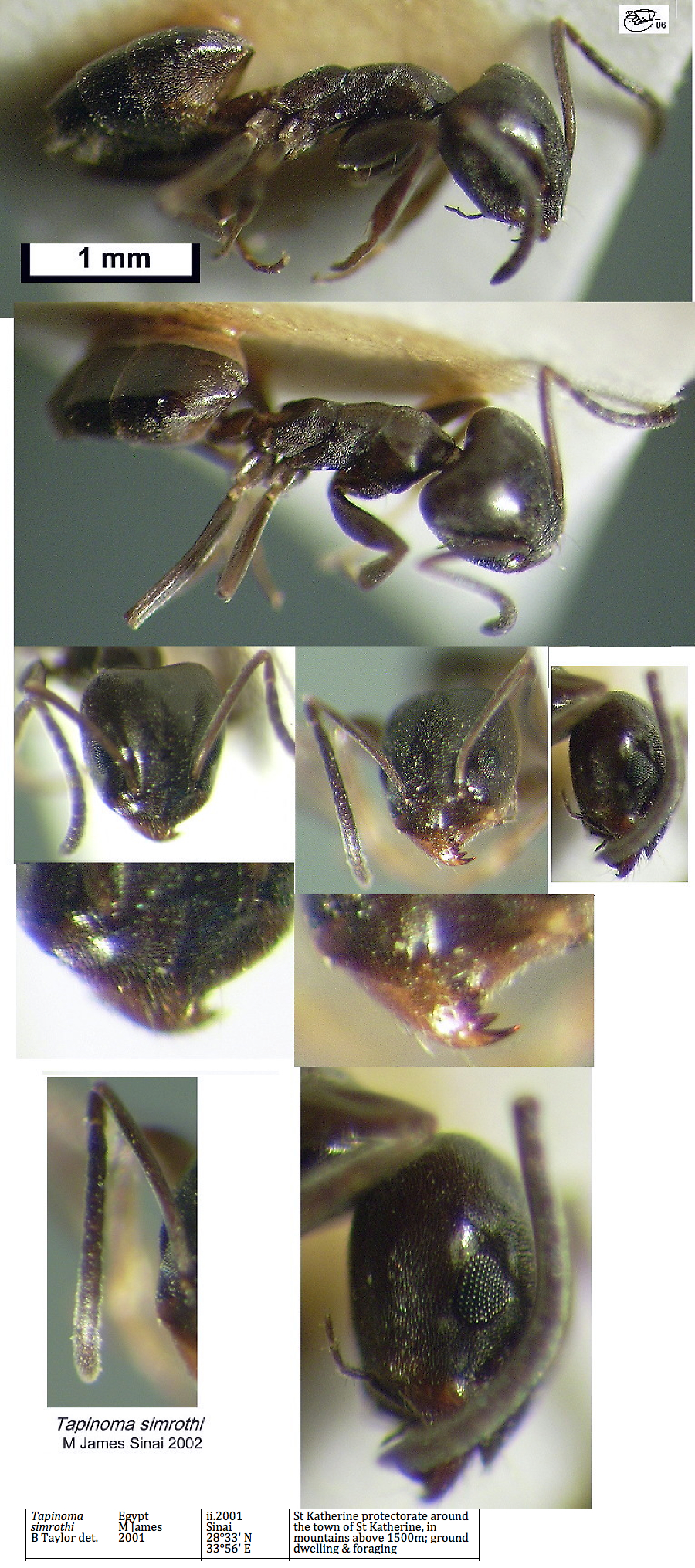Tapinoma simrothi Krausse
 Iran list Iran list Egypt
list Egypt
list
 Type location Sardinia
(Tapinoma erraticum var. Simrothi, Krausse, 1911: 18,
worker only; Emery, 1925d: 49, queen and male, also raised to species)
Abbasanta, 1906 - no images on Antweb (September 2016) Type location Sardinia
(Tapinoma erraticum var. Simrothi, Krausse, 1911: 18,
worker only; Emery, 1925d: 49, queen and male, also raised to species)
Abbasanta, 1906 - no images on Antweb (September 2016)
subspecies phoeniceum (Tapinoma
simrothi var. phoenicia n.,
Emery, 1925d: 50, illustrated, all forms) from Cyprus - see
below
See Shattuck
(1994: 154 [unavailable]).
festae (Tapinoma
simrothi festae n., Emery, 1925d: 51, illustrated,
queen & male) from Greece - raised to species Lush (2009) -
male see http://www.antweb.org/specimenImages.do?code=antweb1008470
Lush, M. J. 2009. Some ant records (Hymenoptera: Formicidae) from the
Middle East. Zoology in the Middle
East, 47, 114-116.
|
Krausse's
(1911) brief description is at  . Emery's
(1925d) full description, with phoeniciae is at . Emery's
(1925d) full description, with phoeniciae is at  . .
Diagnosis follows Collingwood (1985: 242). As a typical
Dolichoderine, has gaster in dorsal view with four visible tergites,
the anal and associated orifices are ventral. propodeum unarmed or
rarely with a pair of blunt tubercles; eyes at or in front of the
midlength of the head on the dorsal surface.
This species has the anterior clypeal border with a distinct notch,
Collingwood (1985) describes it as a slit-like cleft; whole body
including legs dark brown. TL > 2.5 mm.
Collingwood (1985) noted it as abundant in the Middle
East and locally common also in North Africa and parts of South Europe,
active daytime scavenger and also tends Homoptera on shrubs.
Egypt records - as Tapinoma erraticum
Latr. var erratico-nigerrimum Forel, workers and male from
Cairo by Karavaiev (1911: 9; my deduction; latter name is a nomen
nudum in Bolton, 1995: 400, type location Algeria, erraticum
otherwise seem to be from France and the western Mediterranean);
Alfieri (1931) listed findings from the 1925 survey - Behera Province,
3 locations, Dakahlieh Province, El Hachawa, Fayoum province, Tamia;
Finzi (1936: 183); only Dolichoderine listed by Mohamed et al.
(2001) from Sinai, also in Lower Nile and Delta areas of Egypt.
|
 From Egypt, it was
illustrated by Savigny (Audouin, J.-V. 1825-27: Plate 20 Fig 10). From Egypt, it was
illustrated by Savigny (Audouin, J.-V. 1825-27: Plate 20 Fig 10).
|
 Comparison
of the full face view of (left) the phoenicium
type, the Savignyi
drawing, and the Mike James worker (right). Comparison
of the full face view of (left) the phoenicium
type, the Savignyi
drawing, and the Mike James worker (right).
|
 The
photomontage of the type worker of phoenicium is collated from http://www.antweb.org/specimen.do?name=casent0904017 The
photomontage of the type worker of phoenicium is collated from http://www.antweb.org/specimen.do?name=casent0904017
|
Oxford University Museum
specimens
Tapinoma simrothi
B Taylor det.
|
Egypt
M James
2001
|
ii.2001
Sinai
28°33' N
33°56' E
|
St Katherine
protectorate around the town of St Katherine,
in mountains above 1500m; ground dwelling & foraging
|
1
|
 |
Tapinoma simrothi
B Taylor det. |
Jordan
A Lenoir
148
|
21.ii.2012
Dead Sea
31°42'51.1" N
35°35'09.3" E
|
392 m
worker
|
1
|
 |
Tapinoma simrothi
B Taylor det. |
Iran
R Nafisi
06
|
19.x.2012
36°12'N
57°40'E
|
Sabzevar- Khorasan
3206 ft
City park
|
4
|
 |
Tapinoma simrothi
B Taylor det. |
Iran
S Moradloo
18
|
20.vi.2012
32.11°N
50.26°E
|
Halab
1302 m 31°C
City cemetery
|
3
|
 |
Tapinoma simrothi
B Taylor det. |
Iran
E Aram
33
|
24.vi.2012
37.21°N
48.27°E
|
Nowdeh
1485 m
hand collected
mountain on tree
|
|
 |
Tapinoma simrothi
B Taylor det. |
Iran
F Heidary
16
|
27.vi.2014
27.38°N
52.29°E
447 m
|
Sayyedhashemi
hand collected
near farm; on tree
|
3
|
 |
|
 The
photomontage is of workers collected in the Sinai
Desert, Egypt, St Katherine protectorate around the town of St
Katherine, in mountains above 1500m, in early 2001, by Mike James, a
research student of Francis Gilbert. Mike James commented that it is a
solitary forager active even at the hottest time of day, when it moves
very fast over the gravel with its abdomen cocked. The
photomontage is of workers collected in the Sinai
Desert, Egypt, St Katherine protectorate around the town of St
Katherine, in mountains above 1500m, in early 2001, by Mike James, a
research student of Francis Gilbert. Mike James commented that it is a
solitary forager active even at the hottest time of day, when it moves
very fast over the gravel with its abdomen cocked.
Type form - Elqasmia
(Belbis), 21.II.2003 (4); Wadi El-Arish, 14.III.2002 (1) (SHC); Ebn
Salam (Daqahliya, Egypt), 13.IV.1999 (3) Leg.M.R.Sharaf (ASUC), phoenicium
- El-Marg, El-Ameryia (Sharaf list).
|
 The
photomontage is of a workers collected in Jordan, Dead Sea; A Lenoir
148. The
photomontage is of a workers collected in Jordan, Dead Sea; A Lenoir
148.
|
 Photomontage of a worker from Iran,
Sabzevar-Khorasan; collector R Nafisi (06) Photomontage of a worker from Iran,
Sabzevar-Khorasan; collector R Nafisi (06)
|
 Photomontage of a worker from Iran,
Halab; collector S Moradloo (18) Photomontage of a worker from Iran,
Halab; collector S Moradloo (18)
|
|